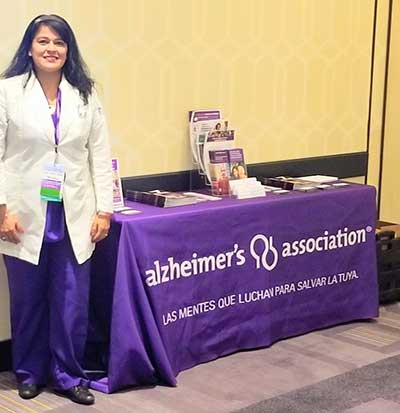This article originally appeared on the Alzheimer’s Association website.
Dr. Perla Rosales-Garay began working at The University of California in 1997, promoting health and nutrition for people living with diabetes. Today she dedicates her time to her patients and to children and older adults in the Hispanic/Latino community, providing free educational classes that focus on healthy living.
In the community of South Bay, San Diego, Dr. Rosales was teaching the Hispanic/Latino population about nutrition, working to educate her neighbors about how to prevent coronary heart disease and hypertension. “When I started teaching a painting course, I incorporated nutritional education through the products we snacked on during the class. I found that this simple act promoted eating more fiber and less sugar and fat, which is something people who took the class have carried on with in their everyday lives.” Those classes kept evolving as Dr. Rosales met more and more people in need.

Dr. Rosales first became connected to the Alzheimer’s Association after speaking at a local conference. At the same time, her newest older adult exercise program, which incorporates coordination, balance and muscle strengthening, took formation. “I wanted to provide the older people in my community with Zumba® Gold classes, which recreate the original dance moves at a lower intensity,” Dr. Rosales says. “I provide these classes in San Diego and when I travel back to Mexico. Everything from dance to resistance exercise in the swimming pool is available to the public.” The program, intended for people age 65 and older, can even be modified for people who require a walker or wheelchair. Most of the classes Dr. Rosales teaches are free of charge, and these types of programs are a simple and sustainable way for people to get much-needed exercise, no matter their abilities. “You don’t need to be a bodybuilder to attend these classes. It’s an opportunity for seniors — which include people living with Alzheimer’s and dementia — to have a good time in a safe environment.”
Read the rest of Dr. Rosales’ story on the Alzheimer’s Association website.
The opinions expressed in this article are those of the author and do not necessarily reflect those of the Diverse Elders Coalition.

